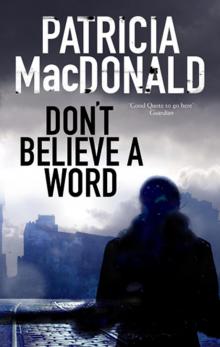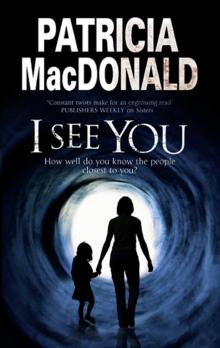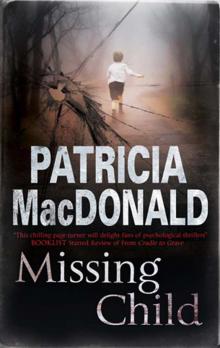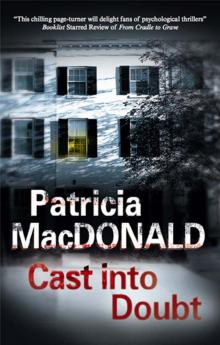- Home
- Patricia MacDonald
The Girl in the Woods Page 5
The Girl in the Woods Read online
Page 5
‘If you need me, I’m right down the hall,’ she said.
Malcolm stared at the wall and did not reply.
Blair went down the hall to her room and sat down on the twin bed. She drew her knees up to her chest, pulling the old flowered quilt around her, looking out the window at the faraway moon. I’ll help him, she vowed to herself. I will help him get through it. Blair shook her head. Celeste had lived her life avoiding confrontation and departed her life leaving huge issues unresolved. It wasn’t just her nephew who was suffering, Blair reminded herself. Thanks to a lie from Celeste, an innocent man sat in his prison, as he had for fifteen years, his life stolen from him. Malcolm was not the only one who needed her attention. Tomorrow, first thing, Blair had to set the wheels in motion. She had to fulfill her promise to Celeste and begin seeking justice for Adrian Jones.
FOUR
The house was freezing, as usual. It seemed to rattle with every gust of wind and cold air leaked through the warped window frames. Wrapped in an old wool bathrobe, Blair sat at the kitchen table and ate cereal from an ancient melamine bowl, so scratched she could barely determine what color it had once been. She was grateful to be alone. Ellis had gone off to work and Malcolm was still sleeping. He needed to rest. Blair’s only company was the cat, who had curled up on the extra kitchen chair in the corner.
As Blair munched on her cereal, she contemplated the problem of Adrian Jones. It seemed logical to go to the police first. She wondered, briefly, if they would resent any implication that they had not done their job sufficiently well all those years ago. It wasn’t their fault Celeste had lied. They would probably be as eager as Blair to make this situation right. A great injustice had been done to Adrian Jones. The sooner it was rectified, the better.
Just then, her cell phone rang and Blair pulled it out of her bathrobe pocket.
‘Blair?’
‘Yes.’
‘It’s Amanda.’
‘Hi Amanda. How are you?’
Amanda sighed. ‘Hanging in there. Look, I think we need to discuss the details of how we’re going to get Malcolm moved in with us. I’m at work, but you could meet me for lunch.’
Blair grimaced. ‘Amanda, we’re going to have to take this slowly.’
‘Why?’ Amanda asked.
‘Well, I mentioned it to my Uncle last night, that Celeste wanted Malcolm to live with you and your family, and he was not happy.’
‘What do you mean? Celeste didn’t tell him?’
‘No, she didn’t. She didn’t tell Malcolm either.’
‘Oh my God.’
‘I know,’ said Blair. ‘She was hopeless that way. Anything to avoid a confrontation.’
‘I just assumed …’ said Amanda.
‘Listen, it could be worse,’ said Blair. ‘At least she took care of it legally. If she hadn’t, there’s no way my uncle would agree to it.’
‘But he doesn’t even want Malcolm.’
Blair sighed. ‘It’s as if Celeste planned to give away property that belonged to Ellis, without telling him. Look, there’s no use in arguing with my uncle. It’s impossible to reason with him. I thought I would get a copy of the legal agreement from the attorney to show him.’
‘Well, you can get a copy from Brooks Whitman. He’s the one we went to see,’ said Amanda. ‘I’d meet you there, but I can’t miss any more work right now. I might need to take some time off while Malcolm is settling in.’
Blair could picture Amanda in her teller’s cubicle at the bank. She was probably violating the rules by talking on the phone.
‘Of course,’ said Blair. ‘Don’t worry. I’ll take care of it. Let me give this attorney a call. The sooner we get started, the better.’
Just then, Blair heard the front door open and a voice called out, ‘Anybody home?’
Blair went out into the hallway and saw Darlene coming into the house, a grocery bag in either hand.
‘Hi,’ said Blair. ‘What are you doing here?’
‘Well, I brought over a few things. I thought I’d … clean up a little bit around here. Run the vacuum. You don’t mind, do you?’
‘Mind?’ Blair yelped. ‘Are you kidding? I’d be grateful. In fact, I need to go out for a while and Malcolm’s upstairs asleep.’
Darlene hung her coat on a hook and waved off Blair’s anxious question.
‘Go on ahead. I’ll stay here with him. I’ll make him some breakfast when he wakes up.’
Blair had the impulse to embrace the older woman, but she hesitated.
‘I can’t thank you enough.’
‘Get on with your business. We’ll be fine.’
Brooks Whitman’s office was located just past the town center in a small, two-story wooden building – once a private home – which was painted a sober, forest green with bronze and black trim. The house had a handicapped ramp as well as steps to the front porch. There was a sign at the roadside, painted in the same colors as the house, announcing the law practice of Whitman, Ferguson and Toll. A small, gravel parking lot in front of the building took up most of what had once been a front lawn. Blair parked her car and went inside.
The first floor was a wide, narrow reception area, blandly outfitted. Functional, not too comfortable chairs were separated by glass end tables and a large reception desk took up most of the room. Blair identified herself to the receptionist and sat down. She had barely thumbed through the pile of Forbes and Business Week magazines, when the door to the inner office opened and a silver-haired man wearing a gray suit and a wedding ring emerged. He spoke quietly to the receptionist and then he turned to Blair.
‘Miss Butler, do you want to come in?’
‘Yes, sure,’ said Blair, jumping up from the chair.
‘I’m Brooks Whitman,’ he said, offering his hand. Blair shook it, and followed the attorney into his office.
‘Thanks for seeing me today,’ said Blair.
‘I’m glad you called,’ said the attorney.
He sat down behind his large desk and smiled. He was surrounded by an array of framed photos. There were family pictures all over the room: wedding pictures, smiling skiing shots, grandchildren, Brooks Whitman and his amiable-looking wife in formal attire. It was the story of generations of a family, captured in happy memories. Blair looked at them and felt a pang of envy. There was little from her own past that bore memorializing. Since she left Yorkville, she had been so busy with her education and her career that her single state never really bothered her. She thought of her life as streamlined. But there were some days, like lately, when she would have been most grateful to be half of a pair, part of a family.
‘Now,’ said the attorney. He straightened the papers on his desk, as if to get his thoughts in order and then folded his hands in front of him. ‘First of all, let me say, I’m very sorry for your loss.’
‘Thank you,’ said Blair.
‘Amanda Tucker called and said you needed a copy of that custody agreement she signed with your sister.’
‘That would be hugely helpful to me,’ said Blair. ‘You see, my sister made these arrangements with Amanda, but never told my uncle. Right now, he is protesting the idea of my nephew moving away from the family home.’
Brooks Whitman grimaced. ‘Well, Celeste was very concerned about her son. She wanted to protect him. I advised her strongly to discuss this with your uncle.’
Blair shook her head. ‘Well, she didn’t do it.’
‘I’m sorry,’ he said. ‘These matters are rarely simple.’ He pressed a button on his intercom and spoke to his assistant, ordering her to make a copy of the agreement between Amanda and Peter Tucker and Celeste. Then he folded his hands on his desk and smiled at Blair. ‘This should take care of it.’
‘And if my uncle tries to block it …’
‘He can try all he likes. It’s a legal agreement, witnessed, notarized and expressing the final wishes of your sister about the custody of her son.’
Blair nodded. ‘Good.’
‘Is there an
ything else I can help you with?’
Blair hesitated. ‘Actually, Mr Whitman, while I’m talking to you,’ said Blair. ‘There is one other thing …’
He looked at her with raised eyebrows.
‘Just before she died,’ said Blair, ‘Celeste said she had to tell me something.’
The attorney waited.
Blair hesitated and then launched into an abbreviated story of Molly’s murder, and Adrian Jones’s alibi. Brooks Whitman listened intently.
‘You see,’ she said, wrapping it up, ‘there was a witness who saw Molly getting into Adrian Jones’s car. Molly was found dead the next day, in the woods, not too far from where he picked her up. Celeste told me that Adrian Jones was not alone when he picked up Molly. She herself was in that car with him. She said that all they did was to give Molly a ride home, but when the police confronted her, she denied it. Adrian Jones was convicted of Molly’s murder and has been in prison ever since. But Celeste knew, all that time, that Molly was fine when she got out of the car.’
Brooks Whitman grimaced. ‘I see …’
‘Do you remember when that happened? It was big news around here.’
‘Of course,’ he said. ‘But it was a long time ago.’
‘Fifteen years,’ said Blair.
‘So, you are saying that your sister could have exonerated this man, but she didn’t.’
‘Correct,’ said Blair.
‘May I ask why she didn’t?’
Blair sighed. ‘As she may have told you, when she had you draw up this custody agreement, my sister and I were raised by a man who is, not to put too fine a point on it, a bigot and a racist. Celeste was afraid, if she admitted she was with Adrian Jones, that Uncle Ellis would put us out on the street.’
Brooks frowned.
‘Mr Whitman … I understand that this does not in any way excuse what she did. But you asked why and that’s why …’
‘Did you … by any chance … record what she said to you? Or write it down and have her sign it?’
Blair shook her head. ‘She kind of blindsided me with this. I know I should have …’
‘Were there any other witnesses?’ he asked.
Blair shook her head. ‘It was too late when I realized what she was telling me. She was dying. She was too weak and disoriented to repeat it again. But she said it, as sure as I’m sitting here. Isn’t there some … law about what people say on their deathbeds being accepted as the truth?’
‘Dying declarations,’ he said.
‘Yes, exactly,’ said Blair. ‘That.’
‘It’s considered trustworthy evidence based on the belief that people who know that they are dying will not lie. It’s an exception to the hearsay rule.’
‘That’s what I thought,’ Blair exclaimed. ‘Well, I will swear to what she told me on any stack of Bibles. She gave Adrian Jones the alibi he needed. She admitted that she lied. With that kind of testimony, we should be able to get him released from jail.’ She could see the attorney’s frown deepen into a pained grimace. ‘Why are you frowning?’ she said.
‘There’s a problem,’ he replied.
FIVE
Blair stared at him. ‘What? What’s the problem?’
Brooks Whitman rubbed his eyes and forehead with the tips of his fingers. ‘I’m not a criminal attorney. I deal mainly with people’s estates. I’ve never actually encountered a dying declaration before. But I’ve read about them and I know that the use of them is severely limited, mainly because the court is reluctant to depart from the general rule regarding hearsay. You know what hearsay is?’
Blair shrugged. ‘Well, sort of. Not exactly …’
‘The report of another person’s words by a witness is not admissible as evidence.’
‘Oh, ok,’ said Blair. ‘But with a dying declaration …’
‘It has to be given when that person is at death’s door.’
‘Which Celeste was …’
‘And it can only be used in homicide trials …’
‘This was a homicide trial,’ Blair insisted.
‘And … if I’m not mistaken … the circumstance must be that the accused is charged with the death of the declarant. Celeste being the declarant.’
Blair shook her head. ‘What? You’re kidding.’
‘I’m afraid not. Generally, these cases are about people who are dying as the result of an assault. When they are asked to identify their assailant, their reply is considered irrefutable because it is their dying declaration. It’s about whoever they accuse, at the point of death.’
‘And that’s it? That’s the only circumstance?’
‘For the declaration to be entered into evidence in court …’
‘But that’s ridiculous,’ Blair protested. ‘Celeste could have given this man an alibi, but she lied and because of her lie, he was convicted of Molly Sinclair’s murder. And now, after these years, she admits it and it’s of no use to him? This man has been in jail for fifteen years!’
Brooks held up his hands. ‘This case has already been decided. If you were to take this information to the police, they might be unwilling to reopen it.’
‘Why?’ Blair demanded. ‘When they know this man is innocent.’
‘They don’t know that. They only have your word for it and it’s not really in their interest to pursue it,’ said Brooks.
‘That’s unbelievable,’ Blair declared. ‘They’ll do nothing? Even if the wrong man went to prison?’
Brooks frowned. ‘Look, I can’t say for certain what they will do, but I do know something about how the police operate. Getting them to reopen this case will be an uphill battle. If you were expecting that you would tell your story and the prison doors would swing open …’
‘I’m not that naive,’ said Blair coolly.
‘You’re right. I apologize,’ said Brooks. ‘But I want to be sure you understand. The law doesn’t work like that.’
Blair, who was sitting with one leg crossed over the other, tapped her sneakered foot impatiently.
‘Well, that may be, but I can’t pretend that I didn’t hear this. That I don’t know it. This man’s life is in my hands. I have to do something. Celeste made me promise I would.’
‘I understand.’
‘And that’s what you think. That the police won’t be interested,’ said Blair.
‘I think it’s highly likely,’ said Brooks.
Blair pondered this a moment. ‘Well, I have to try.’
‘I’m just saying that this could prove to be a very long and frustrating process.’
‘This is a question of what’s right,’ said Blair.
Brooks Whitman smiled ruefully. ‘I do agree with you. If what Celeste told you was true, this man has been incarcerated for a long time, probably for a crime he did not commit. Have you spoken to Mr Jones yet?’
‘Actually, Mr Jones is now called Mr Muhammed. He became a Muslim in prison. And no, not yet. I have not.’
‘You might want to tell him the good news,’ said Brooks.
‘Suddenly it doesn’t feel like such good news,’ said Blair.
‘Well,’ said the attorney cautiously. ‘It could be.’
On her way out of the office, Blair was handed her copy of the agreement between Amanda and Celeste. Once she was in her car, she called Darlene to ask if she could stay a little longer with Malcolm.
‘Oh, heaven’s yes,’ said Darlene. ‘We’re playing Rummikub.’
Blair thanked the older woman. ‘I have a few more errands to do,’ she said.
‘Take your time,’ said Darlene.
Blair googled Greenwood prison and called the number which came up. A recorded announcement came on, detailing rules and regulations for the families of prisoners. No one was to bring any gifts, packages or money to the prison. Donations to the commissary could be made on inmates’ behalf. Inmates could have Skype visits during regular visiting hours – from one to four – which had to be arranged in advance. There was a list of numbers and contacts
for families and law enforcement. Blair listened briefly and then ran out of patience. If people were too busy or lazy to go and see their loved ones, Skype visits made sense. But the discussion which she needed to have with Yusef Muhammed was something that had to be said face-to-face. She looked at the time on the car’s dashboard. She could still make it before four o’clock. She stuffed her phone in her pocket and turned on the ignition.
‘On my way,’ she said.
SIX
It took about thirty minutes to drive there, but with the help of her GPS she had no trouble finding the prison. The sight of its blank brick walls and loops of barbed wire was both depressing and a little bit frightening. The guard at the front desk – a balding man with salt and pepper fringe, who wore a name tag which read: Selenski – seemed bemused when she said that she wanted to see Yusef Muhammed. Blair could see a second guard smirking as he sat at his desk, doctoring his coffee.
‘You’ve wasted your time coming out here,’ said Selenski.
‘Why? It’s visiting hours,’ Blair protested.
‘You can only talk to him on Skype,’ he said.
‘On Skype?’ Blair protested. ‘But I’m here in person!’
‘Doesn’t matter. You can’t do face-to-face. Not on a weekday. Not unless you’re an attorney or a priest.’
‘That’s ridiculous.’
‘Those are the rules. In fact, technically you’re supposed to set up Skype visits in advance, but since this is your first time …’
I came all the way out here so I could see him.’
‘If you listened to the tape, it specifically said that you had to visit the inmate on Skype.’
‘It didn’t say “only on Skype”,’ Blair protested.
‘You weren’t listening,’ said the guard flatly.
‘I don’t understand. Why can’t we meet face-to-face?’ Blair persisted.
‘We only have face-to-face on weekends.’ He pointed to a list that was posted outside the office. ‘Sometimes Saturday, sometimes Sunday.’

 I SEE YOU an unputdownable psychological thriller with a breathtaking twist
I SEE YOU an unputdownable psychological thriller with a breathtaking twist Sisters
Sisters Don't Believe a Word
Don't Believe a Word The Girl in the Woods
The Girl in the Woods Not Guilty
Not Guilty I See You
I See You Missing Child
Missing Child Cast into Doubt
Cast into Doubt